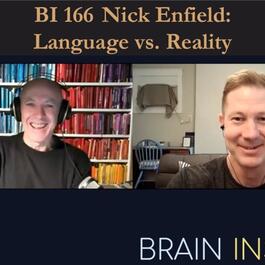
BI 166 Nick Enfield: Language vs. Reality
Support the show to get full episodes, full archive, and join the Discord community. Check out my free video series about what's missing in AI and Neuroscience Nick Enfield is a professor of linguistics at the University of Sydney. In this episode we discuss topics in his most recent book, Language vs. Reality: Why Language Is Good for Lawyers and Bad for Scientists. A central question in the book is what is language for? What's the function of language. You might be familiar with the debate about whether language evolved for each of us thinking our wonderful human thoughts, or for communicating those thoughts between each other. Nick would be on the communication side of that debate, but if by communication we mean simply the transmission of thoughts or information between people - I have a thought, I send it to you in language, and that thought is now in your head - then Nick wouldn't take either side of that debate. He argues the function language goes beyond the transmission of information, and instead is primarily an evolved solution for social coordination - coordinating our behaviors and attention. When we use language, we're creating maps in our heads so we can agree on where to go. For example, when I say, "This is brain inspired," I'm pointing you to a place to meet me on a conceptual map, saying, "Get ready, we're about to have a great time again!" In any case, with those 4 words, "This is brain inspired," I'm not just transmitting information from my head into your head. I'm providing you with a landmark so you can focus your attention appropriately. From that premise, that language is about social coordination, we talk about a handful of topics in his book, like the relationship between language and reality, the idea that all language is framing- that is, how we say something influences how to think about it. We discuss how our language changes in different social situations, the role of stories, and of course, how LLMs fit into Nick's story about language. Nick's website Twitter: @njenfield Book: Language vs. Reality: Why Language Is Good for Lawyers and Bad for Scientists. Papers: Linguistic concepts are self-generating choice architectures 0:00 - Intro 4:23 - Is learning about language important? 15:43 - Linguistic Anthropology 28:56 - Language and truth 33:57 - How special is language 46:19 - Choice architecture and framing 48:19 - Language for thinking or communication 52:30 - Agency and language 56:51 - Large language models 1:16:18 - Getting language right 1:20:48 - Social relationships and languageSupport the show to get full episodes, full archive, and join the Discord community. Check out my free video series about what's missing in AI and Neuroscience Nick Enfield is a professor of linguistics at the University of Sydney. In this episode we discuss topics in his most recent book, Language vs. Reality: Why Language Is Good for Lawyers and Bad for Scientists. A central question in the book is what is language for? What's the function of language. You might be familiar with the debate about whether language evolved for each of us thinking our wonderful human thoughts, or for communicating those thoughts between each other. Nick would be on the communication side of that debate, but if by communication we mean simply the transmission of thoughts or information between people - I have a thought, I send it to you in language, and that thought is now in your head - then Nick wouldn't take either side of that debate. He argues the function language goes beyond the
From "Brain Inspired"




Comments
Add comment Feedback